 ANTI-ZIONISM, ANTISEMITISM, ANTISEMITISM IN THE CHURCH, MEDIA BIAS, NGO’S, THE I/P CONFLICT
ANTI-ZIONISM, ANTISEMITISM, ANTISEMITISM IN THE CHURCH, MEDIA BIAS, NGO’S, THE I/P CONFLICT
David Collier
Tłumaczenie: Małgorzata Koraszewska
Sukces” mitów związanych z „Palestyną” dostarcza doskonałych przykładów tego, jak otacza nas orwellowskie odwrócenie prawdy. Od „Guardiana” i BBC po „Washington Post” i „New York Times”, wszystkie media głównego nurtu prawdopodobnie będą promować niektóre elementy fikcyjnej opowieści o historii „Palestyny”. Biorąc pod uwagę, jak często widzimy te błędy, zastanawiam się, czy dzisiejsi dziennikarze rzeczywiście mają dostęp do archiwów gazet, dla których pracują.
Prawdy, których nie wolno wypowiedzieć
Istnieją prawdy, których dziś główny nury nie trawi. Ci, którzy je promują, są szybko nazywani „ekstremistami”. Uporczywie przypominaj te poglądy, a zostaniesz „anulowany” – „zdjęty z platformy” – i uciszony jako „rasista” lub siewca nienawiści.
Trzy przykłady:
- Większość „rdzennych” Palestyńczyków pochodzi z rodzin, które przybyły na te tereny w ciągu ostatnich 170 lat.
- Nazwa „Palestyna”była obca muzułmanom i była utrzymywana przy życiu jedynie jako myśl romantyczna w ideologii chrześcijańskiej.
- Pojęcie palestyńskiego „uchodźcy” w 2023 roku jest po prostu absurdem.
Nie ma znaczenia, jak bardzo te stwierdzenia mogą zakłócić twój wewnętrzny spokój – albo są prawdziwe, albo nie. Współczesna sprawa palestyńska to toksyczny koktajl, który pierwotnie składał się z zaprzeczania, próby pozbawienia Żydów prawa do samostanowienia, zachodniego pragnienia ropy naftowej, chrześcijańskiego supersesjonizmu, antysemityzmu, rosnącego arabskiego nacjonalizmu, islamistycznej ideologii i politycznej gry między światowymi supermocarstwami. Jeśli zmieszasz to wszystko razem i pozwolisz koktajlowi gnić przez 100 lat, to dzisiejszy ruch pro-palestyński, który zatruwa wszystko, czego dotknie, stanie się nieuniknionym efektem.
Jesteśmy świadkami intensywnego pisania historii na nowo.
Absurdalność
To właśnie w ramach tego fałszywego paradygmatu Nur Masalha, szerzący propagandę rewizjonistyczny „historyk”, może wydać książkę taką jak ta, twierdząc, że „Palestyna” „ma cztery tysiące lat” historii:
W tej fikcyjnej opowieści Masalha histerycznie próbuje uchwycić każdą historyczną wzmiankę o słowie „falastin”, jaką mógł znaleźć, łącząc je wszystkie razem w niedorzecznej próbie twierdzenia, że „Palestyna” miała prawdziwe znaczenie poza religijną koncepcją chrześcijańską. Rezultatem jest zawiły, żałosny mętlik.
Jako przykład, na stronie 259 Masalha powołuje się na dziennik podróży syryjskiego pisarza z końca XIX wieku („Numan Al Qasatli”), który miał w tytule nazwę „Palestyna”. Biorąc pod uwagę, że Al Qasatli był zatrudniony przez Brytyjczyków do pomocy w finansowanym przez chrześcijan „Palestine Exploration Fund”, nie sądzę, żeby to był jakikolwiek dowód. Ale książka Masalhy nie została napisana dla krytycznych czytelników. Sam fakt, że Masalha musi polegać na mapach sporządzonych dla europejskich chrześcijan (na przykład przez mnicha Fra Mauro) w swoich próbach udowodnienia, że „Palestyna” naprawdę istniała, po prostu pomaga udowodnić coś przeciwnego. To wszystko jest zbyt desperackie.
XIX-wieczna Palestyna w mediach
Czytając dzisiejsze zachodnie media, można sobie wyobrazić historię świetności Palestyny. Oto klasyczny przykład – artykuł z „Guardiana”, który romantycznie opisuje Jaffę z końca XIX wieku – jako „handlową i kulturalną stolicę Palestyny”.
[lub tak od początków syjonistycznego osiedlania. Pierwsze dwa miasta były (i są) święte zarówno dla muzułmanów, jak i Żydów, podczas gdy Jaffa, obecnie zagłuszony, gentryfikowany dodatek do Tel Awiwu, była handlową i kulturalną stolicą arabskiej Palestyny. W ostatnich dziesięcioleciach rządów osmańskich pod koniec XIX wieku miała znaczącą populację lokalnych, mówiących po arabsku Żydów. Dla nich Wschód]
A ogłaszając śmierć Rany Kabbasniego w 1990 r., oświadczenie Guardiana informuje czytelników, że urodził się on w 1910 r. w „Acre (Akko), w Palestynie”:
[A po drugiej stronie charakterystycznej Wieży z Zegarem Jaffy, wapiennej kolumny wzniesionej przez Żydów 100 lat temu na cześć osmańskich rządów w Palestynie, rozciąga się Setai Tel Awiw. To]
A może, aby wyrazić to bardziej dobitnie, możemy użyć tego przykładu z NYT „ słońce i starożytny kamień ”:
Ale jak to możliwe? Wiemy, że nazwa „Palestyna” była obca światu muzułmańskiemu, a Turcy używali obszarów administracyjnych (sandżaków) do kontrolowania swojego imperium. Oznaczało to, że Arab w Akce (Akko) i Arab w Sur (Tyr, dzisiejszy Liban) byli sąsiadami, powiązanymi z regionalnymi dystryktami Bejrutu lub Damaszku (ejalety). Pomysł, że Arab z Akko zostałby odrzucony przez Araba z Sur jako cudzoziemiec o innej tożsamości (jak to się stało w latach 1948/9, kiedy celowo umieścili ich w obozach dla uchodźców jako obcych tylko po to, by podtrzymać konflikt), wydawałby się absurdalny dla wszystkich.
„Guardian” w 2015 roku napisał, że Yaffo (Jaffa) było kulturalną i handlową stolicą Palestyny. W 1909 roku pisali, że wszyscy wiedzą, że jest to miejsce, którego należy unikać:
Guardian 5 maja 1909
[ciężar na długo przed Wielkanocą. Przewodniki są zgodne, że Jaffa jest miejscem, którego należy unikać; opuścić pierwszym dostępnym pociągiem do Jerozolimy. Niemniej]
Nigdzie w wielu dziewiętnastowiecznych opisach Jaffy nie znalazłem niczego na poparcie tego, co „Guardian” mówi dzisiaj. Jak zobaczysz, zniekształcenie mediów obejmuje znacznie więcej niż tylko „przepych” tego miasta.
Gdzie była Palestyna?
Aby to udowodnić, spójrzmy na archiwa „Guardiana” i „New York Timesa”. W końcu, czy nie jest to miejsce, do którego dziennikarze „Guardiana” i „New York Timesa” zwracaliby się w pierwszej kolejności, pisząc o historii? I okazuje się, że w XIX wieku te media postrzegały świat trochę inaczej:
Oto jak „New York Times” (po lewej) i „Guardian” (po prawej) faktycznie opisali Akko (Acre) w XIX wieku:
[FORD z Sir CHARLESEM NAPIEREM jako zastępcą. W bardzo krótkim czasie intruzów wygnano z wszystkich pozycji, jakie mieli w Syrii z wyjątkiem fortecy St. Jean d’Acre; a obrona miast była tak silna, że Admirał odmówił przyjęcia odpowiedzialności za atak na nią. Sir CHARLES]
[z1847. Porucznik Lynch najpierw zwrócił się do sekretarza w tej sprawie, rekomendując opłynięcie i zbadanie Morza Martwego i jego całego wybrzeża; mówiąc, że koszt byłby znikomy, ponieważ nasze okręty często przybijają do Acre w Syrii, czterdzieści mil od Jeziora Tyberiadzkiego lub Morza Galilejskiego, skąd rzeka Jordan płynie do wymienionego wyżej morza; że łódź z załogą i zapasami może być przetransportowana z Acre do Tyberiady,]
Opisali Akko jako część “Syrii”. I tak również “New York Times” określił Jaffę w 1840 roku:
[Zbrodnia wobec amerykańskich misjonarzy w Syrii.
ARESZTOWANIE I UKARANIE PRZESTĘPCÓW.
Nasi czytelnicy nie zapomnieli strasznej zbrodni popełnionej niedawno na rodzinie pana Dicksona, amerykańskiego obywatela mieszkającego w Jaffie. Gdy tylko zostali poinformowani, pan Edwin De Leon, nasz konsul generalny na Egipt i podległości,]
“Guardian” o “rozwoju w Syrii” z Akko (Akka) to Hajfy in 1892 roku:
[ROZWÓJ W SYRII
(Od korespondenta)
Wasze łamy już skierowały uwagę na linię kolejową, jaka ma być zbudowana z Akko do Hajfy, na śródziemnomorskim wybrzeży Syrii, do Damaszku. Część, która ma być zbudowana najpierw, zacznie się od Hajfy i przyjmując nadbrzeżną trasę będzie biegła przez żyzne płaszczyzny, aż przekroczy (rzekę) Jordan obok rzymskiego]
I to nie tylko „New York Times” i „Guardian”. To jest wszędzie. Nie ma na świecie dziennikarza, który nie drapałby się w głowę, gdyby kiedykolwiek odważył się zajrzeć do archiwów własnych gazet. Oto raport z 1891 roku o linii kolejowej z Joppy (Jafa) do Jerozolimy „w Syrii”:
„The Reading Times”, 30 kwietnia 1891
Te dwa miasta, Betlejem and Nazaret – dwa kluczowe, historyczne miasta “Palestyny”, są szczególnie godne uwagi:
“Boston Globe”, 08 kwietnia 1873 i “The Times” 05 stycznia 1887
[WYJĄTKOWA RELIGIJNA KŁÓTNIA. – Wieś Betlejem w Syrii, miejsce narodzin Chrystusa, jest obecnie sceną haniebnej kłótni między patriarchami łacińskim i greckim. W uroczym, starym kościele, który podobno stoi w miejscu, gdzie]
[CHRZEŚCIJAŃSKA PRACA W NAZARET. – Panna Hariot M.D. Lee pisze z sierocińca w Nazarecie w Syrii, w listopadzie 1886 r.: – „Czy któryś z waszych czytelników pomógłby mi w mojej pracy, która nie jest z dziećmi uczonymi i szkolonymi w Sierocińcu, ale w dziennych i niedzielnych szkołach w Nazarecie i okolicznych wsiach? Od 70 do 90 dziewczynek przychodzi do mnie codziennie. Odwiedzam także domy.]
Poszukiwania rdzennej ludności Palestyny
Na temat rdzennych mieszkańców Palestyny – którzy najwyraźniej zamieszkiwali te ziemie od tysięcy lat, dzisiejsze media są również dość nieugięte. Nazywają ich ludnością rdzenną. Przykłady z “Guardiana” i “New York Timesa”:
”New York Times” 24 stycznia 2001 i “Guardian” 2 maja 1998
[Dla prawdziwego i trwałego pokoju rdzenni Palestyńczycy muszą mieć przyznane podstawowe prawa człowieka i muszą kontynuować]
[historycy (Benny Morris, Ilan Pappe, Avi Schlaim, Tom Sege i inni) by pokazać, że rdzenni Palestyńczycy byli wydaleni siłą, ich wsie zniszczone, ich ziemia zabrana, ich społeczeństwo zlikwidowane.]
A jednak w łatwo dostępnych archiwach tych gazet istnieją dowody bardzo odmiennej historii:
”Newburn SPR” 26 września 1834
[był już dzień, zanim dotarł do Gazy. Zbliżając się do miasta, które, jak większość starożytnych i słynnych miast wzdłuż wybrzeża, jest obecnie zredukowane do nędznej wioski, pół tureckiej i pół arabskiej, z może kilkoma chrześcijanami pod ochroną konsula – spotkał parę Arabów, którzy patrzyli surowo na]
![”Morning Post” 1 września 1860[co zrobił i prezenty zostały dostarczone. Ten pasza jest uważany za wyjątkowo energicznego w rządzeniu. Mohamedańscy imigranci z Berberii utworzyli małą kolonię na północ od Jeziora Tyberiadzkiego; jest to fanatyczny, antychrześcijański lud; korespondują z przyjaciółmi w Afryce]](http://www.listyznaszegosadu.pl/upload/article/bild/5964/984137/morning-post-1860__1__s.jpg) ”Morning Post” 1 września 1860
”Morning Post” 1 września 1860[co zrobił i prezenty zostały dostarczone. Ten pasza jest uważany za wyjątkowo energicznego w rządzeniu. Mohamedańscy imigranci z Berberii utworzyli małą kolonię na północ od Jeziora Tyberiadzkiego; jest to fanatyczny, antychrześcijański lud; korespondują z przyjaciółmi w Afryce]
”Granville Free” 10 maja 1878
[CZERKIESI W SYRII
Napływ Czerkiesów do Syrii powoduje znaczny niepokój w Bejrucie i innych miejscach. Od zakończenia wojny przybywają tysiącami do różnych portów na wybrzeżu, i mówi się, że każdy jest uzbrojony w świetny i nabity karabin]
![”News and Observer” 4 lipca 1886[okręg. Od kiedy kilka linii żeglugowych zaczęło regularnie zawijać do Hajfy, nastąpił zdecydowany wzrost populacji i handlu. Populacja wynosi co najmniej 4 tysiące, a ponad połowa tego to sekty chrześcijańskie.]](http://www.listyznaszegosadu.pl/upload/article/bild/4233/984141/christian_news-and-obserrver-4-jul-1886_s.jpg) ”News and Observer” 4 lipca 1886
”News and Observer” 4 lipca 1886[okręg. Od kiedy kilka linii żeglugowych zaczęło regularnie zawijać do Hajfy, nastąpił zdecydowany wzrost populacji i handlu. Populacja wynosi co najmniej 4 tysiące, a ponad połowa tego to sekty chrześcijańskie.]
”The Star” 1 lipca 1884
[przez rząd turecki. Byłoby trochę trudno połączyć tę teorię z tym, co dzieje się obecnie w Cezarei. Te ruiny przedstawiono jako przyszłe domy dla muzułmańskich emigrantów z Bośni i Hercegowiny, którzy wszyscy są Słowianami. niektórzy nie znają ani słowa po turecku i uciekli pod chroniące skrzydło Sułtana od chrześcijańskich rządów Austrii w prowincjach oddanych jej w Traktacie z Berlina. Są oni awangardą dużego napływu, który wkrótce nastąpi; i byłem zdumiony odwiedzając ich nową kolonię kilka dni temu pokazem energii i bogactwa, jakie przedstawiają. Wytyczono szeroką ulicę, która przechodzi bezpośrednio nad pozostałościami rzymskiej świątyni zbudowanej przez Heroda na cześć Cezara i Rzymu -]
”Allentown” 2 lipca 1879
[Obecne Betlejem ma około 300 domów i populację 2,5 tysiąca Greków, Ormian i Turków, ci pierwsi głównie zatrudnieni w produkcji różańców, krucyfiksów i paciorków. Każda część]
“Birmingham J&G” 3 maja 1856
[dowodząc; że ludzie mają bardzo silną i trwałą miłość do kraju, a szczególnie przywiązanie do życia we wsi; że nieustanna i chętna imigracja z Egiptu do Syrii świadczy o wyższości rozproszonych rządów Turcji nad wysoce scentralizowanym Egiptem; i że ktokolwiek ceni tureckich]
To jest z opisu populacji w Jaffie w 1875 roku:
”IOM Weekly”, 13 lutego 1875,
[Podobnie jak w Aleksandrii, są tu przedstawiciele niemal każdego narodu pod słońcem, Turcy, Syryjczycy, Arabowie, Nubijczycy, Egipcjanie, Żydzi, Hindusi, Grecy, Amerykanie i Europejczycy, i dla nas najbardziej interesującym widokiem jest oglądanie ich w ich narodowych strojach, i tubylców wszędzie, palących swoje długie, tureckie fajki,]
Żyd mieszkający dziś na ziemi swoich przodków jest traktowany przez większość mediów jako kolonialny najeźdźca, podczas gdy „Palestyńczycy” – mieszanka imigrantów z Afryki Północnej, Bośni, Sudanu, Arabii, Czerkiesji, Grecji i Turcji , stojąc obok potomków tysięcy chrześcijańskich misjonarzy i niedobitków żołnierzy egipskich i tureckich, którzy nigdy nie wyjechali – są traktowani jako ludność „rdzenna”?Jeszcze gorzej! Kiedy fala się odwróciła i potomkowie tych Egipcjan i Syryjczyków wrócili do domów, nazwano ich „uchodźcami” i zamknięto w obozach.Nadszedł czas, aby po prostu podrapać się w głowę w zdumieniu, jak łatwo wszyscy jesteśmy oszukiwani.
Rzeźnicy historii
Kiedy ci chrześcijanie używali terminu „Palestyna” – mieli na myśli „Ziemię Świętą” – co z kolei odnosiło się konkretnie do żydowskiej ojczyzny. Na tym właśnie polegało historyczne zmartwychwstanie „Palestyny”. To finansowany przez chrześcijan „Palestine Exploration Fund” dosłownie wepchnął „Palestynę” ponownie na mapy w drugiej połowie XIX wieku – napędzany przez chrześcijańską ideologię, która była zainteresowana powrotem Żydów do domu. Kiedy widzisz „starożytne mapy” Palestyny rozpowszechniane w Internecie jako „dowód” istnienia Palestyny – często na tym się opierają.
Ale jest jeszcze gorzej. Jeśli Ramallah i Jerozolima są w ich „Palestynie”, to dlaczego nie ma Ammanu i Irbidu w ich „Palestynie”? W oczach chrześcijańskiego Zachodu były tak samo „Palestyną”, jak Nazaret i Kafarnaum:
[BADANIE PALESTYNY
Fotografie niedawnych odkryć ekspedycji wysłanej przez Palestine Exploration Society przywieziono do miasta i tworzą ciekawy zapis poczynionych postępów. Są zrobione w różnych miejscach ziemi Moab, Gilead i Baszan, które Society zmapowało do swojej pracy. Na zdjęciu z Ammanu, Rabbat Ammon ze Starego Testamentu i miejsce, które oblegał Joab, kiedy ‘umieścił Uriaha]
[znaleziono sarkofagi i zrobiono fotografie Akropolu, teatru i rzymskiego mostu), Cezarea (kiedyś rzymska metropolia kraju, teraz najbardziej opustoszałe miejsce w Palestynie), Nazaret, Irbid, starożytna Arbela, ziemia Genezaret, Migdel, starożytna Magdala i Kapernaum.]
Amman, Palestyna?
Wątpię, by „Times” czy „Guardian” kiedykolwiek marzyli o określeniu Irbidu lub Ammanu jako miast dzisiejszej „Palestyny”. Raport BBC na temat „historycznej Jordanii” nie zawiera nawet słowa „Palestyna”. Czy możesz sobie wyobrazić BBC publikujące artykuł o Akko bez odniesienia do tego fikcyjnego miejsca? Pamiętacie to z Guardiana?
Ale Akko nie miało nic wspólnego z Palestyną. Ani starożytną Filisteą. Akko było w Syrii czyli Libanie. Własne archiwum “Guardiana” mówi im to raz za razem:
”Guardian” 2 kwietnia 1903
[MACEDOŃSCY WIĘŹNIOWIE W SYRII.
(Telegram Reutersa)
Bejrut (Syria), 24 marca
21 marca turecki parowiec Alexandros przybył z Salonik z 52 macedońskimi więźniami na pokładzie. Wyszli na brzeg i pomaszerowali do miejscowego więzienia. Mówi się, że nie są politycznymi więźniami, ale zwykłymi przestępcami, którzy zostali skazani na karę więzienia jakiś czas temu. Trzydziestu dwóch z nich wysłano do Trypolisu, a pozostali przejdą wkrótce do St. Jean d’Acre.]
Rodzi to poważne pytania dotyczące nierzeczywistego, ahistorycznego i złośliwego nadużycia słowa „Palestyna” jako opisu w mediach głównego nurtu. A jeśli Palestyna opiera się na chrześcijańskiej Ziemi Świętej, to Palestyna, do której się odwołują, to tylko jej zachodnia część. Badanie „Palestine Exploration Fund” w Palestynie, często błędnie przedstawiane jako mapa całej Palestyny, było właśnie wynikiem badań w „Zachodniej Palestynie”:
Co oczywiście oznacza, że istniała również „Wschodnia Palestyna”. Badanie „Wschodniej Palestyny” przyniosło również mapy, które obejmują Amman i sąsiednie miasta:
”Boston Globe” 9 grudnia 1872
[Niemniej cały nurt świętej historii jest umieszczony w Palestynie od wschodu i w stosunkach, jakie Izrael miał z Edomem, Moabem, Ammonem, Baszanem i pustkowiami, z których wyłonił się jako nowy naród, co czyni badania tego regionu niemal zasadniczymi dla doskonałego zrozumienia niektórych ważnych faktów historii nowoczesnej cywilizacji. Jest to region na wschód od (rzeki) Jordan, który Palestinian Exploration Society szczególnie ma zamiar nam pokazać.
Wtedy wszystkie gazety o tym wiedziały, ale z jakiegoś powodu najwyraźniej o tym zapomniały. Powiedzcie dziś „Jordania to Palestyna” – kolejny prosty fakt oparty na prawdzie historycznej – a na pewno zostaniecie „anulowani”.
Dzisiejsze media zaangażowały się w masową kampanię rewizjonistyczną, która sugeruje, że dobrze prosperujący kraj zwany Palestyną naprawdę istniał – ale wyłącznie na obszarze, na którym dzisiaj istnieje Izrael. To jest kompletna, ahistoryczna bzdura – która została wyraźnie zaprojektowana, by podważyć żydowską ojczyznę.
Spójrzcie na to jawne kłamstwo na temat „Palestyny” z Guardiana z 2003 r. – celowo napisane, by podkopać Żydowski Dom:
”Guardian” 6 marca 2003
[między świeckimi a religijnymi Żydami, która datuje się do przybycia pierwszych syjonistów do tego, co było Palestyną pod koniec XIX wieku.]
Ile jeszcze razy trzeba to powtarzać – TO NIE BYŁA PALESTYNA – więc dlaczego mówicie, że była? Aby osłabić Żydów. Nie może być innego powodu.
Prawda jest oczywista. Musisz tylko otworzyć oczy i umysł – a potem znaleźć odwagę, by to głośno powiedzieć.
*David Collier – brytyjski badacz i bloger zajmujący się badaniem antysemityzmu w mediach i organizacjach.
 In Latest Challenge Israeli Rugby Coach Calls for Formal Inquiry Into ‘Discriminatory’ Actions by South African Rugby Union
In Latest Challenge Israeli Rugby Coach Calls for Formal Inquiry Into ‘Discriminatory’ Actions by South African Rugby Union Athletes from South Africa and the US competing in the 2015 Rugby World Cup. Photo: David Roberts via Wikimedia Commons.
Athletes from South Africa and the US competing in the 2015 Rugby World Cup. Photo: David Roberts via Wikimedia Commons.
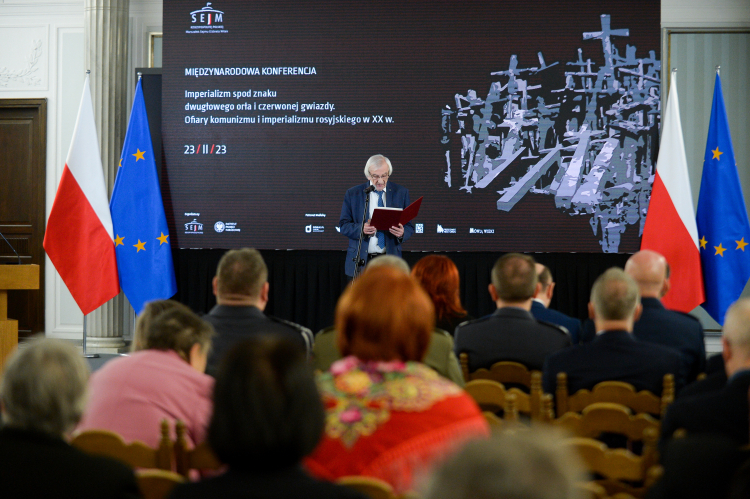



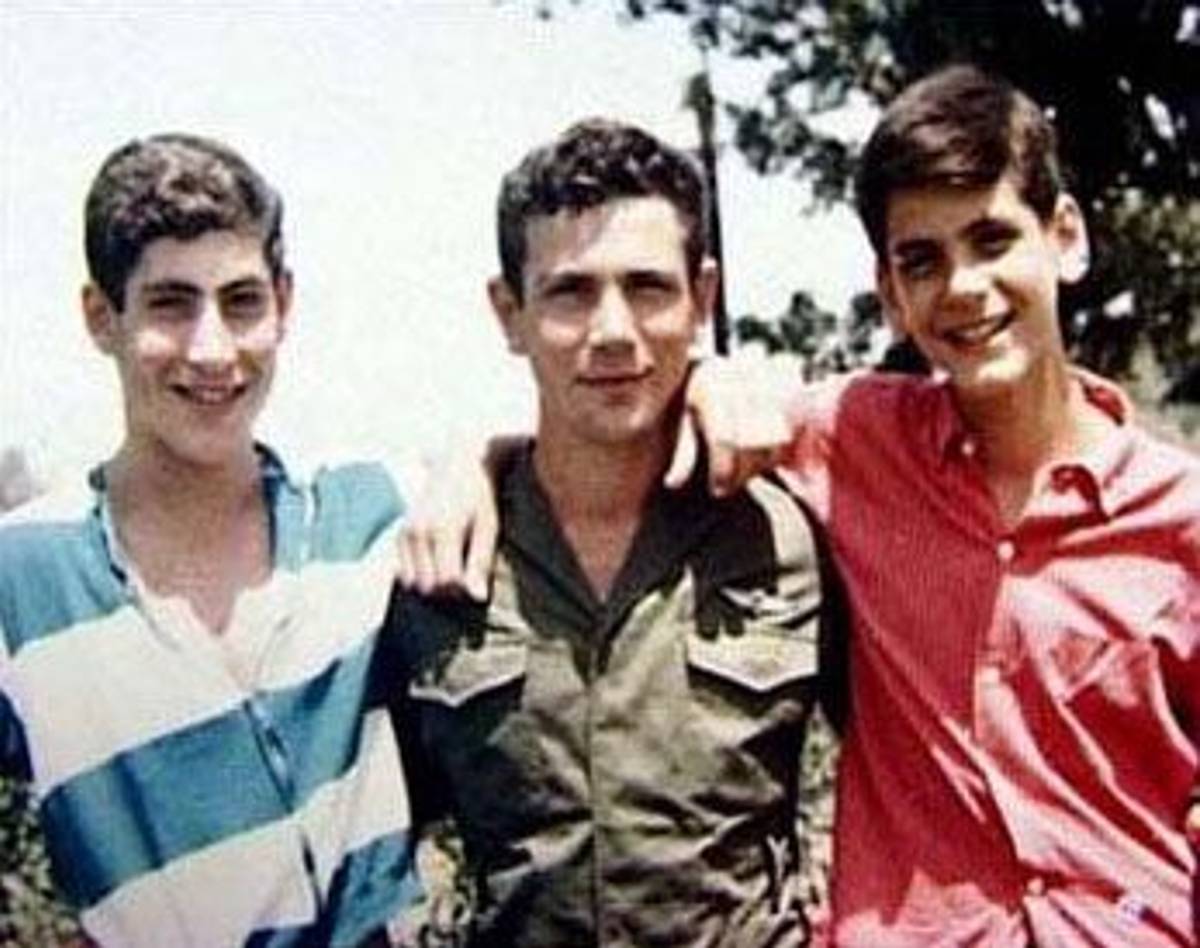



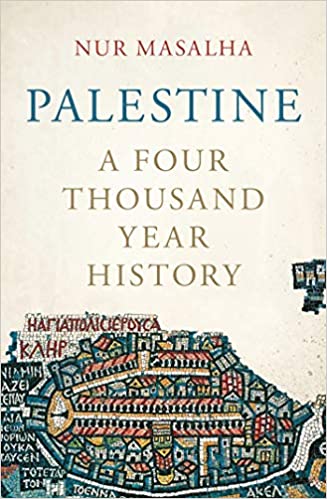
![[lub tak od początków syjonistycznego osiedlania. Pierwsze dwa miasta były (i są) święte zarówno dla muzułmanów, jak i Żydów, podczas gdy Jaffa, obecnie zagłuszony, gentryfikowany dodatek do Tel Awiwu, była handlową i kulturalną stolicą arabskiej Palestyny. W ostatnich dziesięcioleciach rządów osmańskich pod koniec XIX wieku miała znaczącą populację lokalnych, mówiących po arabsku Żydów. Dla nich Wschód]](http://www.listyznaszegosadu.pl/upload/article/bild/9397/984111/guardian_jaffa-1__1__s.jpg)
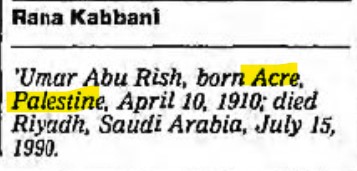
![[A po drugiej stronie charakterystycznej Wieży z Zegarem Jaffy, wapiennej kolumny wzniesionej przez Żydów 100 lat temu na cześć osmańskich rządów w Palestynie, rozciąga się Setai Tel Awiw. To]](http://www.listyznaszegosadu.pl/upload/article/bild/4256/984117/nyt-jaffa-14-mar-2019_s.jpg)
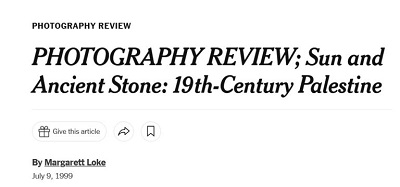
![Guardian 5 maja 1909[ciężar na długo przed Wielkanocą. Przewodniki są zgodne, że Jaffa jest miejscem, którego należy unikać; opuścić pierwszym dostępnym pociągiem do Jerozolimy. Niemniej]](http://www.listyznaszegosadu.pl/upload/article/bild/3831/984121/guardian-_5-May-_1909_s.jpg)
![[FORD z Sir CHARLESEM NAPIEREM jako zastępcą. W bardzo krótkim czasie intruzów wygnano z wszystkich pozycji, jakie mieli w Syrii z wyjątkiem fortecy St. Jean d’Acre; a obrona miast była tak silna, że Admirał odmówił przyjęcia odpowiedzialności za atak na nią. Sir CHARLES]
[z1847. Porucznik Lynch najpierw zwrócił się do sekretarza w tej sprawie, rekomendując opłynięcie i zbadanie Morza Martwego i jego całego wybrzeża; mówiąc, że koszt byłby znikomy, ponieważ nasze okręty często przybijają do Acre w Syrii, czterdzieści mil od Jeziora Tyberiadzkiego lub Morza Galilejskiego, skąd rzeka Jordan płynie do wymienionego wyżej morza; że łódź z załogą i zapasami może być przetransportowana z Acre do Tyberiady,]](http://www.listyznaszegosadu.pl/upload/article/bild/7495/984123/gnyt_acre_s.jpg)
![[Zbrodnia wobec amerykańskich misjonarzy w Syrii.ARESZTOWANIE I UKARANIE PRZESTĘPCÓW.
Nasi czytelnicy nie zapomnieli strasznej zbrodni popełnionej niedawno na rodzinie pana Dicksona, amerykańskiego obywatela mieszkającego w Jaffie. Gdy tylko zostali poinformowani, pan Edwin De Leon, nasz konsul generalny na Egipt i podległości,]](http://www.listyznaszegosadu.pl/upload/article/bild/4512/984125/jaffo2_s.jpg)
![[ROZWÓJ W SYRII(Od korespondenta)
Wasze łamy już skierowały uwagę na linię kolejową, jaka ma być zbudowana z Akko do Hajfy, na śródziemnomorskim wybrzeży Syrii, do Damaszku. Część, która ma być zbudowana najpierw, zacznie się od Hajfy i przyjmując nadbrzeżną trasę będzie biegła przez żyzne płaszczyzny, aż przekroczy (rzekę) Jordan obok rzymskiego]](http://www.listyznaszegosadu.pl/upload/article/bild/3076/984127/Screenshot-2023-02-13-115024_s.jpg)

![”New York Times” 24 stycznia 2001 i “Guardian” 2 maja 1998[Dla prawdziwego i trwałego pokoju rdzenni Palestyńczycy muszą mieć przyznane podstawowe prawa człowieka i muszą kontynuować] [historycy (Benny Morris, Ilan Pappe, Avi Schlaim, Tom Sege i inni) by pokazać, że rdzenni Palestyńczycy byli wydaleni siłą, ich wsie zniszczone, ich ziemia zabrana, ich społeczeństwo zlikwidowane.]](http://www.listyznaszegosadu.pl/upload/article/bild/6813/984133/nyt_guardian-768x166_s.jpg)
![”Newburn SPR” 26 września 1834[był już dzień, zanim dotarł do Gazy. Zbliżając się do miasta, które, jak większość starożytnych i słynnych miast wzdłuż wybrzeża, jest obecnie zredukowane do nędznej wioski, pół tureckiej i pół arabskiej, z może kilkoma chrześcijanami pod ochroną konsula – spotkał parę Arabów, którzy patrzyli surowo na]](http://www.listyznaszegosadu.pl/upload/article/bild/8673/984135/christians_s.jpg)
![”Morning Post” 1 września 1860[co zrobił i prezenty zostały dostarczone. Ten pasza jest uważany za wyjątkowo energicznego w rządzeniu. Mohamedańscy imigranci z Berberii utworzyli małą kolonię na północ od Jeziora Tyberiadzkiego; jest to fanatyczny, antychrześcijański lud; korespondują z przyjaciółmi w Afryce]](http://www.listyznaszegosadu.pl/upload/article/bild/5964/984137/morning-post-1860__1__s.jpg)
![”Granville Free” 10 maja 1878[CZERKIESI W SYRIINapływ Czerkiesów do Syrii powoduje znaczny niepokój w Bejrucie i innych miejscach. Od zakończenia wojny przybywają tysiącami do różnych portów na wybrzeżu, i mówi się, że każdy jest uzbrojony w świetny i nabity karabin]](http://www.listyznaszegosadu.pl/upload/article/bild/6429/984139/CIRCASSIAN_s.jpg)
![”News and Observer” 4 lipca 1886[okręg. Od kiedy kilka linii żeglugowych zaczęło regularnie zawijać do Hajfy, nastąpił zdecydowany wzrost populacji i handlu. Populacja wynosi co najmniej 4 tysiące, a ponad połowa tego to sekty chrześcijańskie.]](http://www.listyznaszegosadu.pl/upload/article/bild/4233/984141/christian_news-and-obserrver-4-jul-1886_s.jpg) ”News and Observer” 4 lipca 1886
”News and Observer” 4 lipca 1886![”The Star” 1 lipca 1884[przez rząd turecki. Byłoby trochę trudno połączyć tę teorię z tym, co dzieje się obecnie w Cezarei. Te ruiny przedstawiono jako przyszłe domy dla muzułmańskich emigrantów z Bośni i Hercegowiny, którzy wszyscy są Słowianami. niektórzy nie znają ani słowa po turecku i uciekli pod chroniące skrzydło Sułtana od chrześcijańskich rządów Austrii w prowincjach oddanych jej w Traktacie z Berlina. Są oni awangardą dużego napływu, który wkrótce nastąpi; i byłem zdumiony odwiedzając ich nową kolonię kilka dni temu pokazem energii i bogactwa, jakie przedstawiają. Wytyczono szeroką ulicę, która przechodzi bezpośrednio nad pozostałościami rzymskiej świątyni zbudowanej przez Heroda na cześć Cezara i Rzymu -]](http://www.listyznaszegosadu.pl/upload/article/bild/1151/984143/bosnia-the-star-1-jul-1884-768x655_s.jpg)
![”Allentown” 2 lipca 1879[Obecne Betlejem ma około 300 domów i populację 2,5 tysiąca Greków, Ormian i Turków, ci pierwsi głównie zatrudnieni w produkcji różańców, krucyfiksów i paciorków. Każda część]](http://www.listyznaszegosadu.pl/upload/article/bild/1205/984145/allentown_2-jul-1879_s.jpg)
![“Birmingham J&G” 3 maja 1856[dowodząc; że ludzie mają bardzo silną i trwałą miłość do kraju, a szczególnie przywiązanie do życia we wsi; że nieustanna i chętna imigracja z Egiptu do Syrii świadczy o wyższości rozproszonych rządów Turcji nad wysoce scentralizowanym Egiptem; i że ktokolwiek ceni tureckich]](http://www.listyznaszegosadu.pl/upload/article/bild/3491/984147/The-Birmingham-Journal-and-General-Advertiser-3-may-1856-768x225_s.jpg)
![”IOM Weekly”, 13 lutego 1875,[Podobnie jak w Aleksandrii, są tu przedstawiciele niemal każdego narodu pod słońcem, Turcy, Syryjczycy, Arabowie, Nubijczycy, Egipcjanie, Żydzi, Hindusi, Grecy, Amerykanie i Europejczycy, i dla nas najbardziej interesującym widokiem jest oglądanie ich w ich narodowych strojach, i tubylców wszędzie, palących swoje długie, tureckie fajki,]](http://www.listyznaszegosadu.pl/upload/article/bild/54/984149/IOW-WEEKLY-1875-768x245_s.jpg)
![[BADANIE PALESTYNYFotografie niedawnych odkryć ekspedycji wysłanej przez Palestine Exploration Society przywieziono do miasta i tworzą ciekawy zapis poczynionych postępów. Są zrobione w różnych miejscach ziemi Moab, Gilead i Baszan, które Society zmapowało do swojej pracy. Na zdjęciu z Ammanu, Rabbat Ammon ze Starego Testamentu i miejsce, które oblegał Joab, kiedy ‘umieścił Uriaha]
[znaleziono sarkofagi i zrobiono fotografie Akropolu, teatru i rzymskiego mostu), Cezarea (kiedyś rzymska metropolia kraju, teraz najbardziej opustoszałe miejsce w Palestynie), Nazaret, Irbid, starożytna Arbela, ziemia Genezaret, Migdel, starożytna Magdala i Kapernaum.]](http://www.listyznaszegosadu.pl/upload/article/bild/7220/984151/jordan1_s.jpg)
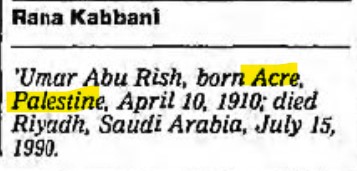
![”Guardian” 2 kwietnia 1903[MACEDOŃSCY WIĘŹNIOWIE W SYRII.(Telegram Reutersa)
Bejrut (Syria), 24 marca
21 marca turecki parowiec Alexandros przybył z Salonik z 52 macedońskimi więźniami na pokładzie. Wyszli na brzeg i pomaszerowali do miejscowego więzienia. Mówi się, że nie są politycznymi więźniami, ale zwykłymi przestępcami, którzy zostali skazani na karę więzienia jakiś czas temu. Trzydziestu dwóch z nich wysłano do Trypolisu, a pozostali przejdą wkrótce do St. Jean d’Acre.]](http://www.listyznaszegosadu.pl/upload/article/bild/4099/984155/gaurdian-2-apr-1903_s.jpg)
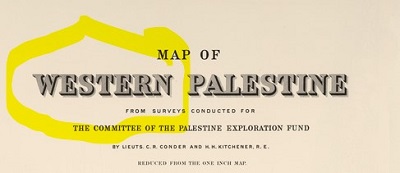
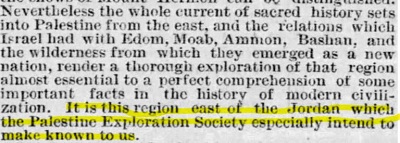
![”Guardian” 6 marca 2003[między świeckimi a religijnymi Żydami, która datuje się do przybycia pierwszych syjonistów do tego, co było Palestyną pod koniec XIX wieku.]](http://www.listyznaszegosadu.pl/upload/article/bild/3359/984163/what-was-palestine-guardian-6-mar-2003_s.jpg)